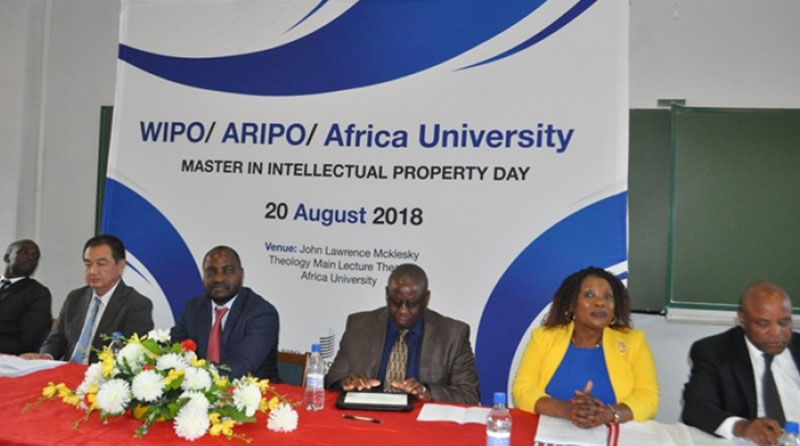The African Regional Intellectual Property Organization (ARIPO) and its partners in the Master in Intellectual Property (MIP) degree programme, Africa University (AU) and the World Intellectual Property Organization (WIPO), dedicated August 20, 2018 to commemorate the 10th anniversary of the MIP programme at Africa University campus in Mutare, Zimbabwe.
Guest speakers, Professor Robert Mafoti, who is the interim Vice-Chancellor of Pan-African University of Mineral Science and Technology and Chief Executive Officer of the Scientific and Industrial Research and Development Centre (SIRDC) and Mr. Kwirirai Chigwere a Director for Tanganda Tea Company (a Zimbabwean company) delivered keynote addresses.
In his address, Professor Mafoti, who has more than 120 US patents to his name encouraged the new cohort of MIP students to utilize the IP knowledge and skills they were to acquire to promote IP systems in Africa. He also implored the audience which was made up of staff and students from different faculties of the university to regard IP as any other assets of value. “Success today depends on harnessing the power of the human mind to create wealth.” However, he said, “to generate wealth from IP requires appropriate laws, so governments should put the necessary legislations to protect innovation.”
He also urged African governments to put money into technology, research and development if their countries were to have meaningful and sustainable wealth. “Without innovation there can never be any change, but everything will stagnate. In Africa we will always have serious problems of stagnation if we don’t invest in research.” He gave as examples, Japan, South Korea and Singapore who embraced technology to develop their economies and were spending substantially on research. “Why don’t we prioritise the technologies that are pertinent to our economies instead of running to the West to buy their goods?” he bemoaned. While successful companies invested on average 10% of their revenues on research, African economies on the other hand did token investments of less than 0.1%.”
He also implored students to bring out value in their education. “IP training is very critical, but let’s not become such scholars as those who go to university only to get Masters and PHD certificates and hang them in offices. Africa has problems because we have many scholars who love to hang certificates. Yes, you have a PHD or Masters, but what have you done for mankind? What can we write after your name? Challenge your governments, your research centres, companies to say it’s no longer business as usual, we need to continue to bring change,” he said.
WIPO, represented by its Counsellor, Martha Chikowore, welcomed the new students into the programme and thanked all the partners for their respective roles they are playing to support the programme through scholarships and sponsorship of lectures for the programme. She said Africa’s industry and society were looking for solutions to their everyday challenges. To that effect she challenged the students to provide the solutions to the problems. She informed the students that the world was moving far with technology and as such most solutions to modern problems were technological and were coming in the form of intangible capital and therefore Africa needed to quickly adapt.
The Director General of ARIPO Mr. Fernando dos Santos affirmed ARIPO’s continued commitment to the MIP programme through student scholarships, teaching staff and facilities for the practical phase of the course at the ARIPO Office, and facilitation of field visits to relevant institutions. He said that IP training was critical in addressing IP human resource capacity for the continent. Mr dos Santos shared his pleasure in the findings of the Tracer Study that was conducted which revealed that MIP graduates were taking leading roles in championing IP matters in their respective countries.He said that as a result of such positive outcomes, the Organization’s resolve to expand the programme to Kwame Nkrumah University of Science and Technology (KNUST) in Ghana and at the University of Dar es Salam in Tanzania has been boosted.
The representative of the government of Japan Mr Niagawa also expressed the commitment of his government through the Japan Funds-in-Trust to support African countries to promote their IP systems saying, “Having strong African IP systems is one of the critical foundations to encourage innovation and to attract foreign investment as well as sustainable development”. He thus urged the new students to help in building IP systems in their countries after they complete their studies.
Meanwhile, the partners also took the occasion to launch a textbook titled, “Intellectual Property Law, Practice and Management: Perspectives from Africa”, which was published jointly by the AU, ARIPO and Japan Patent Office (JPO) courtesy of financial support provided by the Japanese government. Launching the book, one of the editors Mr Emmanuel Sackey, who is also ARIPO’s IP Development Executive, said the book has managed to make even the most complex areas of IP more comprehendible for students studying for any IP course. Another book which was published by the partners chronicling the history of the MIP programme from inception to the 10th cohort was also launched on the MIP day.
The MIP programme was launched in 2008. The other key partners in the programme who were in attendance were representatives of the governments of Japan and Zimbabwe. The commemoration also saw the official welcoming of students who have been enrolled in the 11th cohort of the programme. The MIP programme has to date graduated 295 students coming from 26 African countries.

